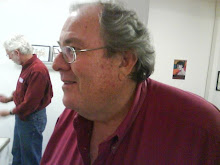Monday, October 2
Sacramento Poetry Center presents
Andy Jones and Brad Henderson.
7:30 p.m., SPC/HQ for the Arts,
1719-25th (25th and R) Tim Kahl hosts.
451-5569. Free.
Taylor Graham reads at The Other Voice in Davis 7:30pm at Davis Unitarian Church
Tuesday, October 3
SPC Poetry Workshop, 7:30pm, Hart Senior Center, 27th & J. Bring 15 - 20 copies of your one-page poem. Info: Danyen, (530) 756-6228. Free. www.sacramentopoetrycenter.org/SPC Workshop News.
Wednesday, October 4
Mics and Moods features Heather Christian at Capitol Garage, 1500 K Street. 10pm-midnight. Features and Open Mic hosted by Khiry Malik. Info: www.malikspeaks.com or 492-9336. 21 and over / $5 cover.
Thursday, October 5
Poetry Unplugged presents TBA. Open mic before/after. Hosted by Mario Ellis Hill.
8pm at Luna’s Café, 1414 16th Street.
Info: 441-3931 or www.lunascafe.com. Free.
Vibe Sessions at Cobbler Inn, 3520 Stockton Blvd. (next to Colonial Theater) Hosted by Flo Real 8-11pm. $5.00 All ages. Open Mic for comedians, singers, poets.
Saturday, October 7
First Saturday Poetry Series
Sojourner Truth Art Center, 2251 Florin Rd. (Corner of Tamoshanter and Florin). 7pm.
Hosted by Noah Hayes and Felicia McGee. All ages / $5.00. Come early for workshop.
Info: www.malikspeaks.com
Escritores del Nuevo Sol’s writing workshop and potluck on 1st Saturdays. 11am.
La Raza Galeria Posada, 1024 - 22nd Street (NEW LOCATION) Sacramento. For info call Graciela Ramirez, 456-5323 or joannpen@comcast.net.
Monday, October 9
Richard Beban reads at the Sacramento Poetry Center. Hosted by Indigo Moor. 7:30 p.m. SPC/HQ for the Arts, 1719-25th (25th and R) 451-5569. Free.
Tuesday, October 10
SPC Poetry Workshop, 7:30pm, Hart Senior Center, 27th & J. See Oct 3 for details
Rae Gouirand
Bistro 33 in the Historic City Hall,
226 “F” Street, at 3rd and “F” Streets in Davis.
Bistro 33 Series
Phone (530) 756-4556
Wednesday, October 11
Sharyn Stever reads at the Book Collector. Come celebrate the release of Heron’s Run, Sharyn’s new chapbook from Rattlesnake Press. The Book Collector, 1008 24th Street, Sacramento. Rattlesnake will also release Tim Kahl’s new littlesnake broadside: Mysterious Rebus.
Mics and Moods at Capitol Garage, 1500 K Street. 10pm to midnight. Features and Open Mic hosted by Khiry Malik. Info: www.malikspeaks.com or 492-9336. 21 and over / $5 cover.
Dr. Andy’s Poetry and Technology Hour, host Andy Jones, 5pm, KDVS-90.3 FM or subscribe to podcast at www.kdvs.org. www.culturelover.com.
Thursday, October 12
Vibe Sessions features Random Abiladeze – up and coming local spoken word and hip-hop artist at Cobbler Inn, 3520 Stockton Blvd. (next to Colonial Theater) Hosted by Flo Real 8-11pm. $5.00 All ages. Open Mic for comedians, singers, poets.
Poetry Unplugged presents TBA. Open mic before/after. Hosted by Geoffrey Neil. 8pm at Luna’s Café, 1414 16th Street. Info: 441-3931 or www.lunascafe.com. Free.
Monday, October 16
Sacramento Poetry Center presents
Poets of Luther Burbank High School.
hosted by Bob Stanley. 7:30 p.m., SPC/HQ for the Arts, 1719-25th
(25th and R) 451-5569. Free.
Tuesday, October 17
SPC Poetry Workshop, 7:30pm, See October 3 for details
Wednesday, October 18
Urban Voices presents Mary Mackey. The renowned novelist, poet, filmmaker and publisher is also a dynamic reader. Don’t miss this! Hosted by B.L. Kennedy, 6:30 – 8 p.m. South Natomas Library, 2901 Truxel Rd. Free.
Mics and Moods at Capitol Garage, 1500 K Street. 10pm to midnight. Features and Open Mic hosted by Khiry Malik. Info: www.malikspeaks.com or 492-9336. 21 and over / $5 cover.
Moore time for Poetry: Terry Moore’s Access Television Show, 1st & 3rd Wednesdays, 9pm, co-host Tyra Moore. Access Sacramento, Channel 17. updates: tvguide.com. (916) 208-7638.
Thursday, October 19
Poetry Unplugged presents Bob Stanley. Open mic before/after. Hosted by frank andrick. 8pm at Luna’s Café. See October 5 for details.
Vibe Sessions at Cobbler Inn, 3520 Stockton Blvd. (next to Colonial Theater) Hosted by Flo Real 8-11pm. $5.00 All ages.
Open MIc for comedians, singers, poets.
Saturday, October 21
Underground Poetry Series features Red Fox poets Wendy Williams & Brigit Truex
plus Lori Jean Robinson and Random Abiladeze. plus open mic. 7-9pm, $3.00. Underground Books, 2814 35th Street (35th and Broadway). La-Rue’ is the series host. If you would like to be a featured poet contact Terry Moore at 455-POET.
Sunday, October 22
Taylor Graham will be reading from her new book, The Downstairs Dance Floor, winner of the Robert Phillips Poetry Chapbook Prize. The Book Collector
(1008 24th St., Sacramento) at 4 pm.
Monday, October 23
Sacramento Poetry Center presents Joshua Clover, author of The Totality For Kids (2006) and Madonna anno domini (1997) winner of the Walt Whitman Award from The Academy of American Poets. Clover teaches at UC, Davis, and contributes to Village Voice and the New York Times. Host Tim Kahl. 7:30 p.m., SPC/HQ for the Arts, 1719-25th (25th and R) 451-5569. Free.
Tuesday, October 24
SPC Poetry Workshop, (See October 3 for details)
Terry Moore
Bistro 33 in the Historic City Hall,
226 “F” Street, at 3rd and “F” Streets in Davis.
Bistro 33 Series
Phone (530) 756-4556
Wednesday, October 25
Dr. Andy’s Poetry and Technology Hour, 5pm, KDVS-90.3 FM or www.kdvs.org.
Mics and Moods at Capitol Garage, 1500 K Street. 10pm to midnight. Features and Open Mic hosted by Khiry Malik. Info: www.malikspeaks.com or 492-9336. 21 and over / $5 cover.
Thursday, October 26
Poetry Unplugged features Art Beck and Jane Blue plus open mic before/after.
Hosted by B.L. Kennedy. 8pm at Luna’s Café, 1414 16th St. Info: 441-3931 or www.lunascafe.com. Free.
Vibe Sessions presents Kevin Sandbloom at Cobbler Inn, 3520 Stockton Blvd. (next to Colonial Theater) Hosted by Flo Real 8-11pm. $5.00 All ages. Open MIc for comedians, singers, poets.
Saturday. October 28
“The Show” Poetry Series features
Neo-Soul vocalist Kevin Sandbloom from Los Angeles, plus extended open mic time Born 2B Poets with special guest
Bloom Beloved. 7-9 pm Wo'se Community Center (Off 35th and Broadway), 2863 35th Street, Sac; $5.00. Info: T.Mo at (916) 455-POET.
30 Monday, October 30
Sacramento Poetry Center
no reading tonight
Wednesday, November 1
Pat Schneider—a public talk at the Sutter Cancer Center. Wine and refreshments. Free! Pat created the writing method used at Sutter. Pat has pioneered a way to engage in Whitman's dream: poetry en masse. Poetry no longer just confined to books or a select few but poetry that breathes the sweat on the street and is spoken by the ignorant as well as the intellectual.
Saturday, September 30, 2006
Tuesday, September 26, 2006
Fictional Character: The Ernie Poems
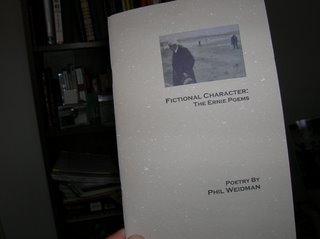 "Fictional Character: The Ernie Poems" is a trajectory of convulsions gifted to one human being. Phil Weidman's chapbook (Rattesnake Press; Rattlechaps Chapbook Series #27) places all of his burdens onto one character, Ernie, and revels in the freedom of release. While the author submits to the speculation that this collection of work is a projection of his own psyche, he also exalts poetry as a "bridge to a fresh perspective" and striving for "that."
"Fictional Character: The Ernie Poems" is a trajectory of convulsions gifted to one human being. Phil Weidman's chapbook (Rattesnake Press; Rattlechaps Chapbook Series #27) places all of his burdens onto one character, Ernie, and revels in the freedom of release. While the author submits to the speculation that this collection of work is a projection of his own psyche, he also exalts poetry as a "bridge to a fresh perspective" and striving for "that."I picked three poems, "They Don't Go There", "A Matter of Scale", and "A Frequent Answer", as they pain the questions of rejection, sexuality, microscopic analyses, and ambivolence. Seduced by Ernie in "They Don't Go There" I revisited this quest for understanding the nature of love, and the simple but unacknowledged causes that lead a man to undisclosure. Are men only to express words of love towards beings that are unconditional towards them? The ability to voice love for a weapon, a pet, things that Ernie probably are attached to, and only perform at his presence and instruction is compared to rewarding a woman with the declaration. I don't want to sound like a male-basher... women "don't go there" either.
The title, "A Matter of Scale" immediately evoked images of Kafka, and a big talking insect. However, Ernie doesn't wake up and discover his nose gone (Gogol), or that he is a gigantic bug. Still on the intuitive perception of what we don't see daily, he brings to clear vision those mites, bugs, or anything else that may be hidden to the naked eye. Begin the poem, and you see, yes, ants, who have better designs of capitalism. Something extraordinary happens, he is able to bring in technology without evoking tiring images of the golden arches, and other excuses to ponder what needs to be fixed. Yes, we are wireless, and so are ants; there is something in the air, and he is the unwilling accomplice.
"A Frequent Answer", emerges as a very open, contemplative piece. In the context of politics, war, and the battle between the classes, Ernie becomes the iconic non-participator. The hero, of course, is the imagination; Ernie is rethinking throughout the poem, speculating that his stiff tongue is one short rope away from martyrdom.
Ernie is complex, and likable.
CAMILLE NORTON—Sept. 25
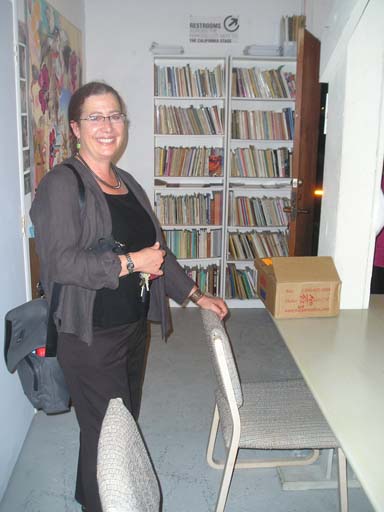
All links below are to .MP3 recordings of Camille Norton’s reading at SPC on Sept. 25. 2006
Camille Norton graced the interior space of the Sacramento Poetry Center and filled it with some interior spaces of her own. The poems she read were all from her book Corruption which ranged from meditations on her time spent in Florence to more personal pieces about her relationship with her father.
She started out reading from Corruption. She read the first two sections of this poem “The Medicis” and “The Monsters.”
Then she read three sections from “Index of Prohibited Images” I. John in the Wild IV, Caravaggio, 1604 II. Judith and Holofernes, Caravaggio 1599 and III. Medusa, Caravaggio, 1597.
The next piece was a sprawling history of Dante’s many burials entitled Napoleon’s Boots and Dante’s Body.
She read “Incomprehensible Triangles” with its epigraph from the great Brazilian novelist Clarice Lispector:
Will I stay lost among the silence of the signals?
I will for I know what I’m like: I never learned to look
without needing more than just to see.
Then she read Aperture, a wonderful piece about passing through the spirit gates to have a gruff encounter with her father the day that he died.
Norton read “In The Bardo,” mentioning that it was written for a friend who had had some difficult encounters in her life.
“Monday Music” was next, and Norton told how the voice in the piece was derived from some nervous energy she had during her visit to the MacDowell Colony for the Arts.
She read “Eight Pieces for Gertrude Stein,” all of them haikus.
Finally, she ended the evening on a light note with Paul Bunyan and his Blue Ox, Babe from the series “Wild Animals I have Known”
For a complete audio log of the entire evening, please e-mail me at tnklbnny@mongryl.com
Monday, September 18, 2006
Frank Andrick and Friends—Sept. 18
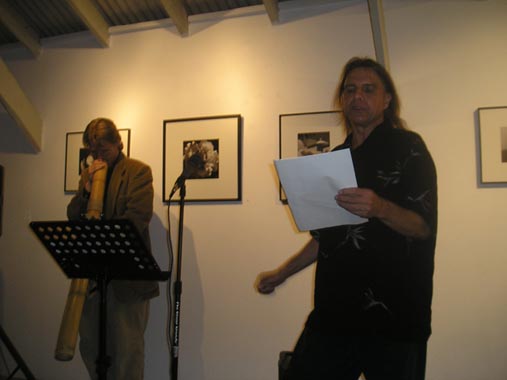
Frank Andrick, miraculous survivor of a thousand maladies and recent returnee from the Lodi hospital tour, took the stage at SPC for a very spirited performance. He brought his buddies Eric and Terryll, who started off the evening . . . some might say as warm-up poets. But this is not show business. This is poetry. On, then, with the high seriousness.
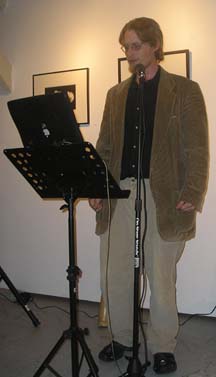
Eric read several poems solo about his recent conversion to poetry. The poems employed mostly very conversational diction that owed their rhythms to surrealist stream-of-consciousness and hip-hop's gigabytes o' internal rhyme. Then he played didgeridoo, snorting and huffing at it like he was invoking the Dreamtime gods via a massive Rasta spliff.
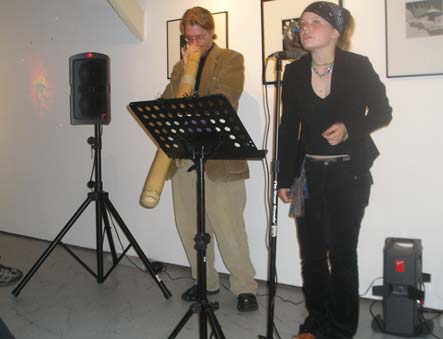
Then his partner Terryll took her spot in front of the podium and asked the audience to call out a number. A number was called out, and she proceeded to do that number on her playlist, with didgeridoo accompaniment (mostly of the low-slow variety . . . as those of us in the front row could hear their mumbled instructions to each other). The first one was dedicated to apathy. She read with a kind of half-song, half-speech lilt in her voice that occasionally slurred words for musical effect the way Rickie Lee Jones might. There were love poems, poems to friends that might seem like love songs but weren't.
Frank Andrick then joined Eric and Terryll for a group reading of a piece that had been performed at the Poetry Marathon, "Frank Andrick is a Name-Dropping Whore." In characteristic style Andrick made fun of himself for this. If I had a nickel for every poet that made fun of himself, well . . . I'd still be poor. Andrick can efface himself in public, and get everyone to watch. How does he do that?
Andrick read a piece that had been translated from the Sumerian, a 4000-year-old text that Frank claimed to be the oldest known poem. Frank, as experimental mythologist, read this piece, editing it from its source so that the stream of imagery read like a very contemporary piece full of jump-cuts and abrupt changes of tone and register. but Frank assured that he did not adulterate the content, what was actually said, in any way from its original form.
Andrick then read some of his pensées, short little "deep thoughts" that were designed to grab the listener and let him/her think about the gravity of what had been said. It was wisdom for those who are in a hurry.
After his recent battle with the medical unknown, Andrick read two poems that were "inspired(?)"/"thrust upon him" as a result of that experience. These poems were a combination of phrases gleaned from his nurses and other medical attendants as well as loose thoughts aimed at oblivion and fueled by the anxiety of his experience. They were phantasmagorical episodes of a descent into medical hell where a syringe is not just a syringe but a surrogate for the great-deflating-pin aimed at the soul's balloon.
The highlight of the evening, though, was Andrick's reading of a piece he had written upon the passing of the great surrealist Philip Lamantia. Lamantia, long known among surrealists as the one anointed by Andre Breton to carry the surrealist torch across America, was a force in the poem that Andrick read. Philip Lamantia's former wife, Nancy Peters, had gotten a hold of it, and proclaimed it to be written in the spirit of her late husband. Andrick captured the essence of Lamantia in the piece complete with its multisyllabic incantations and invocation of the ancient mythic underworld. If Lamantia was the torch-bearer for Breton, could it be that in our humble midst here in the Sacramento region, another torch has been passed to uphold the tradition of American surrealism? Frank Andrick, may you long be counted among the living heirs of Lamantia rather than among the sick and wasted in hospital beds!
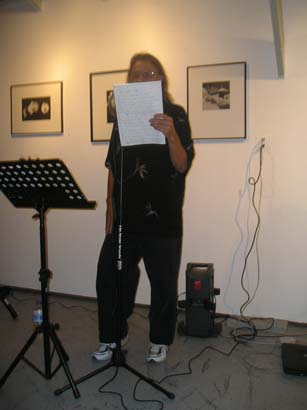
Like one of the great mystics, Frank Andrick plays peek-a-boo with the gods
Saturday, September 16, 2006
Sunday, September 10, 2006
TUPELOETICS at SPC on August 28
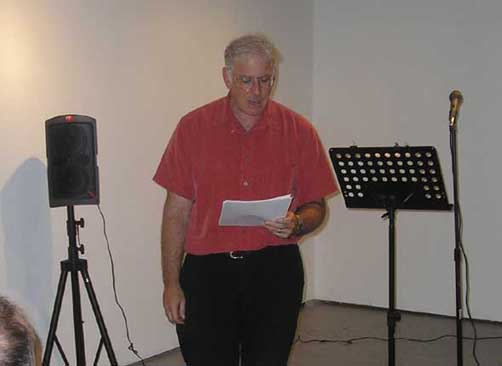
Bob Stanley
Tupeoloetics was the point of focus for a beautiful August evening of poetry at the Sacramento Poetry Center. Contrary to the widely held belief that poetry readings and August do not mix at SPC’s cauldron of well-forged words, the slight breeze and good will made for a lovely evening. Even with the fans turned to their lowest setting the atmosphere was very comfortable. Or maybe it was the newly painted floors done by members of the Asylum Gallery.
Tupeloetics is a group of writers [Bill Moose, Connie Gutowsky, Bill Ludington, Edythe Haendel Schwartz, Bob Stanley] who meet at The Tupelo Cafe every month to discuss their poems and hopefully make them better by sharing. After searching for a name to call their collective, the meeting place, Tupelo Cafe was the most logical choice.
Jim Moose was the first to take his place in front of the mic. He is a retired civil servant - He was a lawyer and administrative law judge in California state service for 37 years. He is the resident historian of the group, and he did not disappoint with this first poem entitled “Oh, the Joy” which was about the Lewis and Clark expedition across The Louisiana Territory, an undertaking that took many years, an undertaking so strenuous that some say it took a toll on Lewis’s sanity. His death in Tennessee in 1809 was thought by many to be a suicide. The title of the piece comes from the moment the two of them gazed upon the Pacific.
Moose’s next poem was entitled “Red Memory.” The opening premise is that a red shard becomes ensconced in the brain of the speaker. The memory is persistent and the speaker regards it as a feminine shape and the mysterious force it possesses. Then the speaker reveals that he did not such a force had been transferred to me.
“Moonlight and Roses” was set in 1945 Yokohama and told of a scene where a tenor held sway in front of packed house of GIs. The tenor sang “Moonlight and Roses” and not a dry eye was left in the house.
In “Lament” Moose spoke of a Sierra trip he’d taken which was too short for him to keep a record of it, so he wrote the poem instead.
“French Major” was a poem dedicated to a man who secretly kept his past as a leader in naval combat even though he had won the Navy Cross in WW II. The speaker of the poem learns from his obituary that he was a Harvard man, that he switched from being a French major to going into law.
Moose also read “Inheritess” which besides the coinage of a new term offered the observation that one is “not less because we can not trace our ancestors, not less for it.” This is so because the speaker states that “your ancestor is mine.”
“America the Beautiful” employed a speaker who is narrating the musical attributes to the song as it is being sung. The chords weigh in to emphasize the lines. Finally, the speaker finds his pride turns to salty tears.
Connie Gutowsky then stepped in front of the mic and declared that her poetic project is the Homemade Bread of Poetry, that is, she employs poems to find the beauty in the quotidian.
The fist poem she read was a sestina inspired by an owl entitled “What is Left?” Tears fall on a desk from the sky. A list of items appear in a liquidambar tree. Dead sculptures form a smorgasbord on the lawn. The owl lets its pellets fall from the tree in rhythm.
Gutowsky introduced the next poem as being one that was inspired by a photo taken after a picnic. In “Where from Here?” the speaker is a girl in a mirror who grows older.
“We’re Talking About” was a poem that used pieces of extraneous conversational phrases (in fact, probably, in particular, largely, potentially) and strung them together into a sound collage
“Smile and Nod” takes place on a cross-Atlantic flight where the speaker encounters the man on the left who coughs. His passport is from Iran, but then he shows the speaker pictures of his daughter, a pharmacist, in Tucson,
“Bouquet” was a triolet in honor of Al that began with opening image of applesauce on a book.
Gutowsky ended with a sonnet entitled “Shredders” that was attack on the bulk mail industry and its invasive means of entering a home.
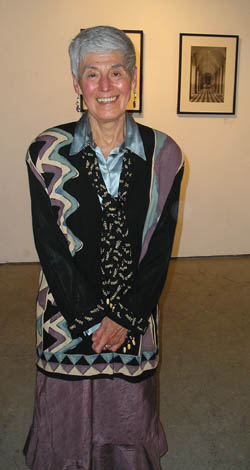
Edythe Haendel Schwartz
Edythe Haendel Schwartz then took her place before the crowd and read
”Lacunae”, a poem she had recently published in The Journal of the American Medical Association (JAMA). She informed the crowd that it is a villanelle written in terza rima.
“Habanera” was a tribute to the Carmen aria and Schwartz’s grandmother whose collection of librettos is discovered, the one of Caruso at the Met in 1936 in particular. The speaker ranges over a number of meditations on the woman’s presence and now absence, finally acknowledging the woman’s love for Carmen.
In ”The Conchologist and the Shoemaker” Schwartz offered that she heard this conversation between a blind UC Davis conchologist and the man at the shoe repair shop. It was a piece that arrived to her out of this moment.
The next piece that she read was a tribute to the Port Orchard Snapping Turtle whose shotgun approach to birthing the next generation left the ping pong-like ball eggs with “odds no better than ours.”
In “Chromatic,” a sonnet in tribute to an interracial couple, the speaker notes that it is impossible to live without skin.
“Reprieve” features a bird that has struck its head on a window and an opportunistic cat waits for its reward as the bird’s heart flutters grace notes and then its wings extend.
In “Swimmer at Master’s Club” Lucille Barry (1910-2005) is the voice in the poem. Her feet are ticking in a 4/4 beat. She flips for a final turn, her pelvis fit with pins. The swim is a metaphor for the life struggled through with prize going to the one who remains alive.
Bob Stanley was the last reader for the evening. He started off with an unnamed poem that implored the listener to “choose who you are” and ended with notion that “everyone should know who they are.”
In “At the Center” Stanley used a number of short phrases and images to produce a collage effect that invited the reader to “spin downward with me.”
In “Trip” Stanley looks at his father, to a time when his father had lost his job, to a time before he could understand.
The nest poem Stanley read was a tribute to the vagaries of the syllabus. It borrowed key words and phrases that were recognizable as syllabus verbiage. The speaker comes to the realization at the end that he must get off the syllabus, the prescribed road map that is never very good at dealing with specific individual concerns in the class.
“In Transit” was arranged around a speaker who was traveling and missed the turn off, only to realize that in trying to regain his position, he was traveling once again.
“What It’s About?” was about the speaker’s senior tripand featured reflections on a friend’s dad who died of leukenia.
In “Morsel” Stanley’s speaker advises, “write about love but not about walnuts.”
Finally, in “Sweet Fire” a poem that Stanley wrote after his recent trip to China, the speaker merges great figures in Chinese history, such as the First Emperor of Chin with jazz legends like Charlie Parker until there is a very mixed ensemble of cats putting it out there for everyone to hear.
Yikes! Wrong Date Listed!
I know how easy it is for these things to happen, but the new issue of PN lists our 9/15 (Escritores' Annual All-Spanish at CSUS) reading for 9/16. The write-up is great, just the wrong day listed. Any way this can be corrected on the online SPC calendar and blog?
Thanks so much,
JoAnn Anglin
Thanks so much,
JoAnn Anglin
Subscribe to:
Comments (Atom)

















